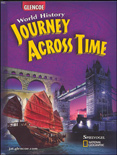
World History: Journey Across TimeChapter 20: Imperialism and World War IChapter OverviewsDuring the 1800s, Europeans looked to other lands for raw materials and new markets. Europeans thought ruling other countries, or imperialism, would increase their power. They ruled by setting up colonies, protectorates, or spheres of influence. Under imperialism, Britain, France, and the United States controlled other countries, such as India and Africa. Britain and China engaged in the Opium War. With Britain's victory, the Chinese agreed to open five ports to British ships, limit taxes on imports, and give the British the island of Hong Kong. Power struggles within China enabled European nations to trade, build, and mine the country. More changes followed when the Qing dynasty fell and after warlords fought one another. Japan was another country struggling for leadership. On the economic front, Japan fought to industrialize. The world recognized Japan as a major power in the 1900s. World War I was caused by nationalism, militarism, conscription, and the formation of alliances, or ententes. By 1914, two major alliances had been formed: the Triple Alliance and the Triple Entente. New weapons, like machine guns, poison gases, tanks, and submarines, helped break through enemy lines. Civilians helped to win the war. Governments used rationing to control the amount of foods and materials used and boosted public opinion of the war with propaganda. The United States entered the war after receiving an intercepted cable between Mexico and Germany. Germany signed an armistice that ended World War I in 1918. The war redrew the lines of Europe, mixing groups of people and causing friction. New Arab regions, called mandates, formed from the Ottoman empire. Like before, nationalism spread through the mandates and Zionists wanted to create a Jewish homeland. Meanwhile, Russia had other problems. Peasants paid high taxes and people wanted a voice in government. Soviets were formed to give a voice to the middle class. Their leader, Vladimir Lenin, seized power in late 1917. |  |















